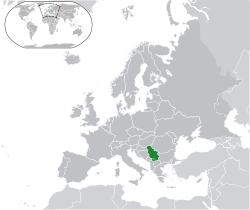Serbia: Belgrade DJ Investigated For War Crimes
By Marija Ristic
The Serbian authorities are investigating the involvement of a Belgrade DJ in war crimes allegedly committed in Bosnia by paramilitaries known as Arkan’s Tigers.
On the request of the Serbian War Crime Prosecutor’s Office, Belgrade police is investigating the role of Srdjan Golubovic, a Belgrade DJ, into war crimes committed in the Bosnian town of Bijeljina in March 1992, Balkan Insight has learned from the prosecution.

It is suspected that Golubovic was a member of the Arkan Tigers, a group of Serbian volunteer fighters lead by the notorious criminal Zeljko Raznatovic Arkan.
Golubovic was arrested in Belgrade at the beginning of September for the possession of illegal arms and drugs.
More than 20 years since the so-called Tigers entered the town of Bijeljina in northeast Bosnia, killing most who came in their way, no member of the unit has faced trial for those war crimes.
In 1999, the International Criminal Tribunal for Former Yugoslavia, ICTY, indicted Arkan for war crimes, but only for the crimes committed in 1995 in the Sanski Most area in northwest Bosnia. However, Arkan died in a mafia shootout in Belgrade in 2000.
That indictment listed 78 names of victims, but only one indictee. The prosecutor who led the investigation, Clint Williamson, claimed they could not identify other members of Arkan’s unit because they had worn masks during the operations.
According to the Hague prosecution, the unit was formed in 1990 as the Serbian Volunteer Guard on the eve of the war in Croatia.
In 1991 they fought in Eastern Slavonia, establishing their headquarters and training centre in the border village of Erdut.
When the war broke out in Bosnia in spring 1992, Arkan’s Tigers fought alongside Bosnian Serb forces in the areas of Zvornik and Bijeljina, in Eastern Bosnia, where, as stated in the ICTY indictment, the Tigers “actively participated in operations in order to secure Serb control over these towns”.
An American photojournalist, Ron Haviv, took some notorious photographs of the Tigers in action in Bijeljina in March 1992. Published in the TIME magazine, they showed masked and uniformed paramilitaries parading over the bodies of the dead civilians they had killed in the streets. Arkan had given Haviv permission to photograph his men.
The Serbian prosecution believes that Srdjan Golubovic could be one of the men in the photos.
According to the ICTY indictment, Arkan’s Tigers were not purely paramilitary as it was discovered that the Unit was financed by Serbia’s state security and two former secret service chiefs, Jovica Stanisic and Franko Simatovic, who were indicted by the ICTY in 2003 and are currently on trial.
Several groups were established by the Serbian secret services “for the purpose of undertaking special military actions” in Croatia and Bosnia,” the indictment said.
“These units included groups, or members of groups, known by the following names: Special Purpose Unit of the Ministry of internal affairs Serbia, Unit for antiterrorist activities, and Unit for Special Operations, JSO, also known as Red Berets or Scorpions, the Serbian Volunteer Guard also known as Arkan’s Men and the elite Serbian Volunteer Guard unit known as Arkan’s Tigers, ” reads the indictment.
For the crimes allegedly committed by Arkan’s Tigers in Bijeljina, Serbia’s prosecutors office investigated in 2010 Borislav Pelevic, former member of Arkan’s unit and currently a member of the Serbian parliament.
However, the investigation was dropped soon after, as the prosecution said there were not enough evidence to prove Pelevic’s role in war crimes committed in Bosnia or Croatia.
Pelevic told the prosecutor that he had been recruited in February 1992, and was sent to Erdut for training until the end of April 1992 and became deputy commander of the Tigers in 1995.
But he denied that anybody from Arkan’s unit was either present where the crimes were committed, or took part in those crimes.

So it took 20 years for some semblance of justice to be activated against these individuals. The crimes of these paramilitary groups is the greatest stain on Serbia’s conscience.